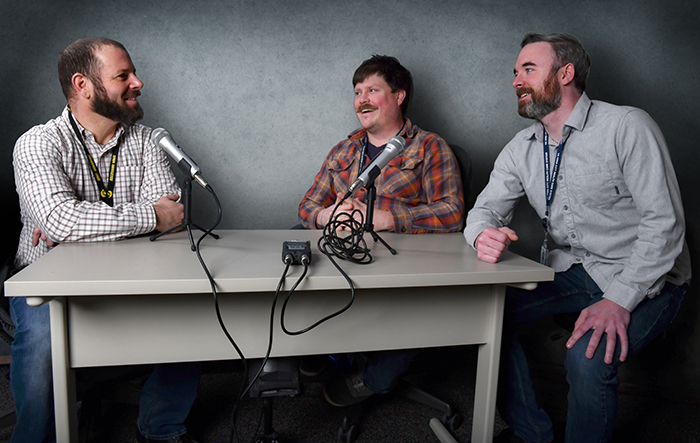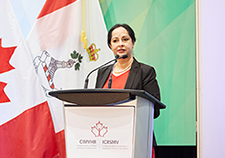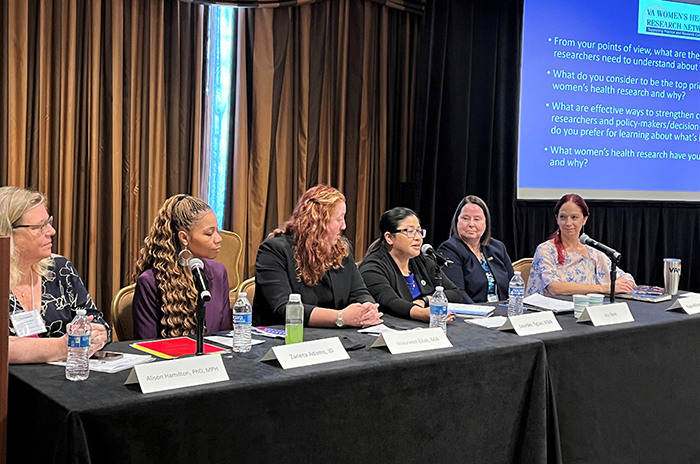Office of Research & Development |
 |


Brandon Rea (far right) and Dr. Levi Sowers (center), co-hosts of the Vets First Podcast, with Dr. Oliver Gramlich of the VA Center for the Prevention and Treatment of Vision Loss. (Photo by Michael Feddersen)
March 1, 2022
By Mike Richman
VA Research Communications
"We really wanted to put Veterans first. Let them tell their stories and explain the problems they have and let researchers and other Veterans hear about that."
Three enemy mortars landed seconds apart. They rattled Josh Marino as he walked on a road with his Army unit in the Iraqi capital, Baghdad, in June 2007. A five-foot-high wall protected him from most of the debris and shrapnel. But the shock waves permeated the wall and “moved my brain around in ways that a brain is not supposed to be moved,” he remembered.
Marino was diagnosed with a concussion and shock. Later examinations showed a traumatic brain injury (TBI) with post-concussive migraines, as well as PTSD.

VA Researcher Named One of U.S.’ Top Female Scientists

Million Veteran Program director speaks at international forum

2023 VA Women's Health Research Conference

Self-harm is underrecognized in Gulf War Veterans
While on deployment, Marino became confused, forgetful, angry, and depressed, and he struggled to perform his regular duties. “The depression took me to a very, very dark place, and I was quite ready to take my own life,” he said.
Just moments from that fateful decision, he sat on the stairs of his barracks smoking a cigarette when a little cat came from underneath the bushes. “I grew up around animals. They had always been a heavy influence on my life. So seeing this little, tiny thing that needed help from me kind of made me realize that maybe there is another path, maybe there’s another escape hatch, so to speak, away from the PTSD, away from the depression. Maybe I could do something that could address my own anxiety while helping other people.”
Today, Marino is fulfilling that mission as a Veteran peer mentor and an education and outreach coordinator at the Human Engineering Research Laboratories, a joint project between the VA Pittsburgh Healthcare System and the University of Pittsburgh. He told the story about the mortar attack, its subsequent effects on him, and his fortuitous encounter with the cat on the Vets First Podcast, one of six podcasts in the VA Podcast Network.
Two researchers with the Center for the Prevention and Treatment of Visual Loss at the Iowa City VA Health Care System, Dr. Levi Sowers and Brandon Rea, host the Vets First Podcast. The broadcast is aimed at speaking to Veterans and giving them an open platform to share their stories, with the goal of making sure they’re heard, and at communicating research to Veterans and a general audience in a coherent manner.
Some of the episodes have featured one interviewee. But the majority have paired a researcher and a Veteran on separate segments. In the case of their podcast featuring Josh Marino, Rea and Sowers followed up by interviewing Rob Otto, the suicide prevention coordinator at the Iowa City VA.
The Vets First Podcast is entering its third six-month season. Sowers and Rea have completed nearly 20 shows thus far, each of which has been 20 to 30 minutes in length.
Why the name Vets First Podcast?
“We really wanted to put Veterans first,” Sowers says. “Let them tell their stories and explain the problems they have and let researchers and other Veterans hear about that. Then try to show or demonstrate how VA is approaching those problems in a way that Veterans and researchers can understand. A lot of these topics are super-complex, even for someone like me who’s in the field. It’s important for us to communicate that clearly to the Veteran, like how working on mice helps Veterans in the long run.”
The hosts hope that Veterans will hear the stories on the Vets First Podcast and know that they are not alone and isolated. They want the podcast to also foster communication and networking among former service members.
“A lot of times, Veterans’ stories aren’t well-heard,” Rea says. “This is a way for them to communicate what has happened to them and what they’re experiencing, and for the general population to know that the government is investing in research to help Veterans. The target audience is also researchers.”
Thus far, the research topics on the Vets First Podcast have included traumatic brain injury, posttraumatic headache, PTSD, kidney disease, substance use disorder, light sensitivity, and suicide prevention.
“We’ve interviewed some Veterans from the conflicts in Afghanistan and Iraq,” Sowers says. “Most of them have had traumatic brain injuries. I don’t think we’ve had a Vietnam Veteran yet. We’ve had a couple of people from the first Gulf War. Some of our guests have just had random injuries whereby they got hurt working in a kitchen and were prescribed opioids for pain and became addicted.”
Rea and Sowers, both of whom are also affiliated with the University of Iowa, have interviewed a few Veterans who have a history of suicidal thoughts. When discussing such a sensitive topic, the hosts try to let the Veterans know that they are in a “safe space” and need to talk only about things that they feel comfortable discussing.
“We’re coming at it effectively from a point of naivete or naiveness,” Rea says. “We don’t know how that feels. However our guests want to communicate is what we encourage. That’s really the focus. We’ll try to guide our interviews, if you will, with certain questions. But it’s really a matter of how the Veterans want to communicate their thoughts and feelings as best as they can.”
Each episode of the Vets First Podcast is posted on the VA blog VAntage Point, where the shows are available for download. One can also listen to the episodes on Spotify, iTunes, and other audio apps. To date, the podcast had garnered more than 6,500 downloads, over 2,000 in the first season and over 4,500 in the second season.
“It’s really taken off,” Sowers says. “The second season focused on topics that people are really interested in. It’s exciting. The underlying message I want to get across is that research is complex and can be scary for a lot of people. We’re trying to simplify that and let people know what VA is doing to help them.”
Given their affiliation with the Center for the Prevention and Treatment of Visual Loss at the Iowa City VA, Rea and Sowers are devoting the third season of the Vets First Podcast to vision problems, with a focus on such topics as macular degeneration, glaucoma, and TBI-related vision loss. Both penetrating and non-penetrating injuries can lead to vision abnormalities.
“We’ve tried to make vision-related topics part of every season because that is our mission,” Sowers says. “But we knew that we needed to expand beyond that. I think we can do an entire season on it. We’ve got it well mapped out.”
During the second season, Sowers and Rea lined up a guest for one of their episodes through the Gary Sinise Foundation, a renowned organization that creates programs to support Veterans, first responders, and their families in need. They interviewed Jim Ravella, a former Air Force fighter pilot who is now the foundation’s vice president of programs. The co-hosts plan to partner in their third season with the Blinded Veterans Association, a non-profit group that helps Veterans and their families overcome the challenges of blindness.
“What’s nice about pairing up with these Veterans organizations is that they know many Veterans who we can talk to,” Sowers says. “These Veterans have been advocates for their own disease or are trying to garner money for an organization or from the government to do research. They’re very active in the world of research. Organizations like the Gary Sinise Foundation and the Blinded Veterans Association know a lot of Veterans that have suffered from these medical issues. They’re a great source of people to interview.”
VA Research Currents archives || Sign up for VA Research updates